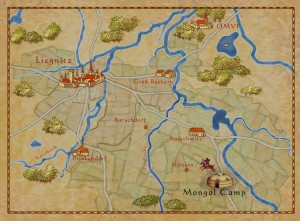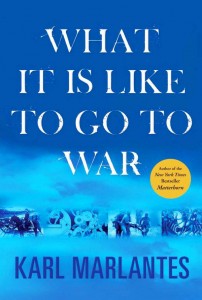Publishing Talks: David Wilk interviews Mark Teppo about The Mongoliad
October 11, 2011 by David
Filed under Ebooks and Digital Publishing, PublishingTalks, The Future
 In this ongoing series of interviews, called Publishing Talks, I have been talking to book industry professionals and other smart people about the future of publishing, books, and culture. This is a period of disruption and change for all media businesses. We must wonder now, how will publishing evolve as our culture is affected by technology, climate change, population density, and the ebb and flow of civilization and economics?
In this ongoing series of interviews, called Publishing Talks, I have been talking to book industry professionals and other smart people about the future of publishing, books, and culture. This is a period of disruption and change for all media businesses. We must wonder now, how will publishing evolve as our culture is affected by technology, climate change, population density, and the ebb and flow of civilization and economics?
I believe that these Publishing Talks conversations can help us understand the outlines of what is happening in the publishing industry, and how we might ourselves interact with and influence the future of publishing as it unfolds.
These interviews give people in and around the book business a chance to talk openly and broadly about ideas and concerns that are often only talked about “around the water cooler,” at industry conventions and events, and in emails between friends. These conversations give people inside and outside the book industry a chance to hear first hand some of the most interesting and challenging thoughts, ideas and concepts being discussed by active participants in the book business.
It’s likely that most listeners of this podcast series are aware of the innovative storytelling project called The Mongoliad. This project, a “transmedia” collaboration of several science fiction and fantasy writers, along with their readers, and others, is one of the more far-reaching experiments in digitally enabled fiction. There are many interesting practical elements to this project, including quality control, story and character continuity, and other issues of control. And there are economic questions as well.
There are all sorts of bigger issues in play here as well, including the notion of author, ownership of ideas and control issues in a collaborative crowdsourcing environment, and the nature of writer and reader in a community setting. Hopefully these issues will continue to be explored and discussed in many other venues.
Mark Teppo is the Chief Creative Officer for Subatai Corporation, which is the operator of The Mongoliad project. Mark plots and fabricates alternate versions of historical eras for this project and others. He is also the author of the urban fantasy series The Codex of Souls (Night Shade Books) and lives in Seattle. His other projects include: Darkline: An on-going research and commentary site dealing with esoterica and the occult and Psychobabel, a pair of non-linear texts—The Potemkin Mosaic and The Psychobabel Folio—the Psychobabel project explores the landscape of dream, the labyrinth of linguistics, and the deconstruction of mythology.
Just after I interviewed Mark for Writerscast, Amazon and Subatai announced that Amazon will be publishing the books related to The Mongoliad. I asked Mark to comment here to provide some additional context for our discussion. Here is what he said:
Regarding the deal with Amazon’s new SF/F imprint, we’re thrilled that they want to bring The Mongoliad to a larger audience. One of the
things that we’ve always said is that, for many of us, a book doesn’t really exist until you can crack it open and bury your nose in its pages. I grew up with books, and still have a house full of them. Rooms seem strangely naked if they don’t have books in them. Digital technology is coming to books, and e-readers are definitely going to change the market, but they don’t make physical books any less a critical part of our being. To that end, partnering with 47North (Amazon’s new S/F imprint) to be able to produce The Mongoliad as a physical book is simply part of what we always wanted to accomplish.
On a more practical side, the e-reading market is still in its infancy. Those of us who spend all day on the Internet easily forget that a significant part of the reading audience prefers physical texts. We’d be remiss in our efforts to entertain everyone if we didn’t make every effort possible to let them enjoy our stories as well. Amazon’s entry into the SF/F publishing space will allow us to put the entirety of the Mongoliad on the shelves in bookstores by the end of 2012, which–in publishing terms–is almost overnight.
I think you will find this discussion about The Mongoliad well worthwhile. It is a really interesting project being done by a very smart and accomplished group of people. I’ve enjoyed reading it as the series has evolved, and recommend it to anyone interested in historical fiction and visionary writing or who might be looking for inspiration to develop other innovative models for digital storytelling. 
Podcast: Play in new window | Download
Karl Marlantes: What It Is Like to Go to War
October 2, 2011 by David
Filed under Non-Fiction, WritersCast
 978-0802119926 – Atlantic Monthly Press – Hardcover – $25.00 (e-book and audiobook editions available)
978-0802119926 – Atlantic Monthly Press – Hardcover – $25.00 (e-book and audiobook editions available)
I read Karl Marlantes’ novel, the extraordinary Matterhorn last year (and interviewed him about it for Writerscast – you can listen to that interview here). I don’t think I am alone in believing that Matterhorn is perhaps the finest and most important war novel of the Vietnam generation; for me at least, it belongs in the pantheon of great American war novels (going back to WWI, Thomas Boyd’s Through the Wheat is another great novel written by an former Marine).
It took Karl Marlantes more than 30 years to write and publish the novel we read as Matterhorn its final form. His new book, What It Is like to Go to War, now follows as a deeply thoughtful and moving work of nonfiction about the nature and meaning of war, and what it means to the individual warriors who participate who fight, as well as to the society that gives them that responsibility.
There are many parallels between the two books. I’d recommend you take on the novel first, spend some time thinking about its story and characters, and then move on to this new work of nonfiction, which is a combination of personal memoir, meditation and social, political and cultural analysis and polemic.
Insofar as fiction gives us our deepest emotional and spiritual truths, Matterhorn cannot fail to move you and allow you to feel the reality of what it is like when our best and brightest go to war. Then What It Is Like to Go to War gives us another carefully wrought perspective, what Marlantes has learned from his own experiences and from many years of studying and thinking about war and society.
And we should all be paying attention to what he says here. America has had more people fighting wars for a longer period of time than at any other time in our history. Indeed what does this say about contemporary American society?
In 1969, when he was just 23, Karl Marlantes was an inexperienced lieutenant in charge of a platoon of Marines whose lives were in his hands. His experiences in the jungles of Vietnam , molded and shaped him throughout his life. He has thought deeply about his wartime experiences, how they affected him and his comrades, as well as how other soldiers before and since have gone through similar experiences. In What It Is Like to Go to War, Marlantes weaves accounts of his own combat experiences with analysis, self-examination, and powerful ideas drawn from his wide reading from Homer to the Mahabharata to Jung.
Unlike many of us who feel that war must be ended in modern society, Marlantes starts from the belief that war is an inevitable component of societal and political being. What he is after is to make us think about preparing warriors not for fighting, which we already do quite well, but for living with the effects on those who go to war that derive from participating in the morally unnatural but societally sanctioned acts of killing other human beings.
Most societies that preceded us have used powerful rituals, myths and ceremonies to integrate acts of war into the fabric of their cultures, and to reintegrate their warriors thoroughly into their societies, while our secular, materialist society really offers no tools or methods to warriors (or for that matter to civilians) to create a holistic “story” of why and how war is meaningful and necessary.
One of the many points he made in this book really struck me is that those who send men and women to war are themselves warriors, that actual soldiers (as opposed to guns and bombs) are their weapons. These individuals must fully comprehend what they do, and must find ways to integrate their own acts of war as much as the soldiers on the battlefield who wield the weapons and who witness so much death and destruction on both sides of battle.
I found that the author’s afterword to the book was very important to my understanding and acceptance of his work:
“We must be honest and open about both sides of war. The more aware we are of war’s costs, not just in death and dollars, but also in shattered minds, souls, and families, the less likely we will be to waste our most precious asset and our best weapon: our young.”
“The substitutes for war…are spirituality, love, art, and creativity, all achievable through individual hard work.”
I can’t recommend this book to readers enough. It’s book that, like the work of my friend, Paul Chappell, (Will War Ever End and The End of War) has the potential to shift our societal dialogue about war and what it can and should mean to a modern society.
There’s a fine review of What It Means to Go to War in the NY Times and a very worthwhile interview with Karl on Livewriters about Matterhorn.
Podcast: Play in new window | Download
